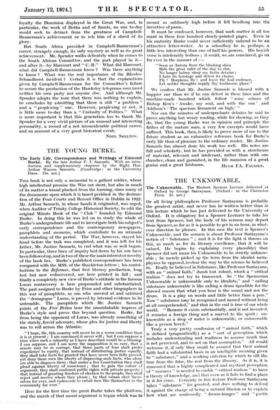THE YOUNG BURKE.
The Early Life, Correspondence and Writings of Edmund Burke. By the late Arthur P. I. Samuels. With an intro- duction and supplementary chapters by the Right Hon. Arthur Warren Samuels. (Cambridge : at the University Press. 25s. net.)
Tins book is not only a memorial to a gallant soldier, whose high intellectual promise the War cut short, but also in much of its matter a brand plucked from the burning, since many of the documents upon which it is based perished in the destruc- tion of the Four Courts and Record Office in Dublin in 1922. Mr. Arthur Samuels, in whose hands it originated, was urged, when Auditor of Trinity College Historical Society, to edit the original Minute Book of the "Club" founded by Edmund Burke. In doing this he was led on to study the whole of Burke's undergraduate life and to investigate both his subject's early correspondence and the contemporary newspapers, pamphlets and memoirs, which contribute to an intimate understanding of the period. The War, however, stayed his hand before the task was completed, and it was left for his father, Mr. Justice Samuels, to end what was so well begun.
In particular, three lines of inquiry laid down by his son have been followed up, and in two of these the main interest or novelty of the book lies. Burke's published correspondence has been
compared with the MSS. of the Shackleton letters ; his contri- butions to the Reformer, that first literary production, long lost but now rediscovered, are here printed in full ; and finally a completely new view of Burke's attitude in the famous
Lucas controversy is here propounded and substantiated. The part assigned to Burke by Prior and other biographers in
this war of pamphlets, as one who sneered at and satirized the " demagogue " Lucas, is proved by internal evidence to be untenable. The pamphlets which Mr. Justice Samuels prints of the Free Briton bear the unmistakable impress of Burke's style and prove this beyond question. Burke, far from being the opponent of Lucas, was already something of the stately, fervid advocate, whose plea for justice and liberty was to roll across the Atlantic.
"I hope, Sir, this country will never be in a worse condition than it is at present ; I am convinced it never will • but I can suppose a time when such a minority as I have described would be a blessing. I can suppose, and I am sorry the supposition is so easy, that a senate may be so corrupt, that three parts of four shall prefer expedience to equity, that instead of distributing justice equally, they shall take facts for granted that have never been fully proved, yet deny those men the liberty of disproving such facts, who alone are able to disprove them ; that under a free Constitution they shall plead against liberty of conscience ; that to gain the colour of argument, they shall confound public rights with private property ; that instead of granting freedom of election to the people, they shall reject and receive whom they please • by that means elect them- selves for ever, and endeavour to entail men like themselves in the community for ever."
Here for the first time the great Burke takes the platform, and the march of that moral argument is begun which was to
mount so sublimely high before it fell headlong into the invective of panic.
It must be confessed, however, that such matter is all too scant in these four hundred closely-printed pages. Even in his maturity Burke could never sufficiently unbend to be an attractive letter-writer. As a schoolboy he is, perhaps, a little less interesting than one of half his powers. His boyish verse is intolerably tedious ; it could, we are convinced, go on for ever in the manner of :—
"Soon as Aurora from the blushing skies
Bids the great ruler of the day to rise, No longer balmy sleep my limbs detains ; I hate its bondage and detest its chains.
Fly ! Morpheus, fly ! and leave the foul embrace, Let nobler thoughts supply thy loathsome place."
We confess that Mr. Justice Samuels is blessed with a happier ear than we if he can detect in these lines and the
machine-made hundred which follow "some echoes of Bishop Ken's 'Awake, my soul, and with the sun' and Addison's "The spacious firmanent on high.'" Nor can the minutes of undergraduate debates be said to prove anything but weary reading, while for showing, as they do, that the young Burke was in opinion and principle the father of the mature man, a very few excerpts would have sufficed. This book, then, is likely to prove more of use to the future student as an exhaustive reference book for Burke's early life than of pleasure to the ordinary reader. Mr. Justice Samuels has almost done his work too well. His notes are full and scholarly, but he has provided us with a storehouse of material, relevant and irrelevant, rather than with one chamber, clean and garnished, in the life mansion of a great






































 Previous page
Previous page